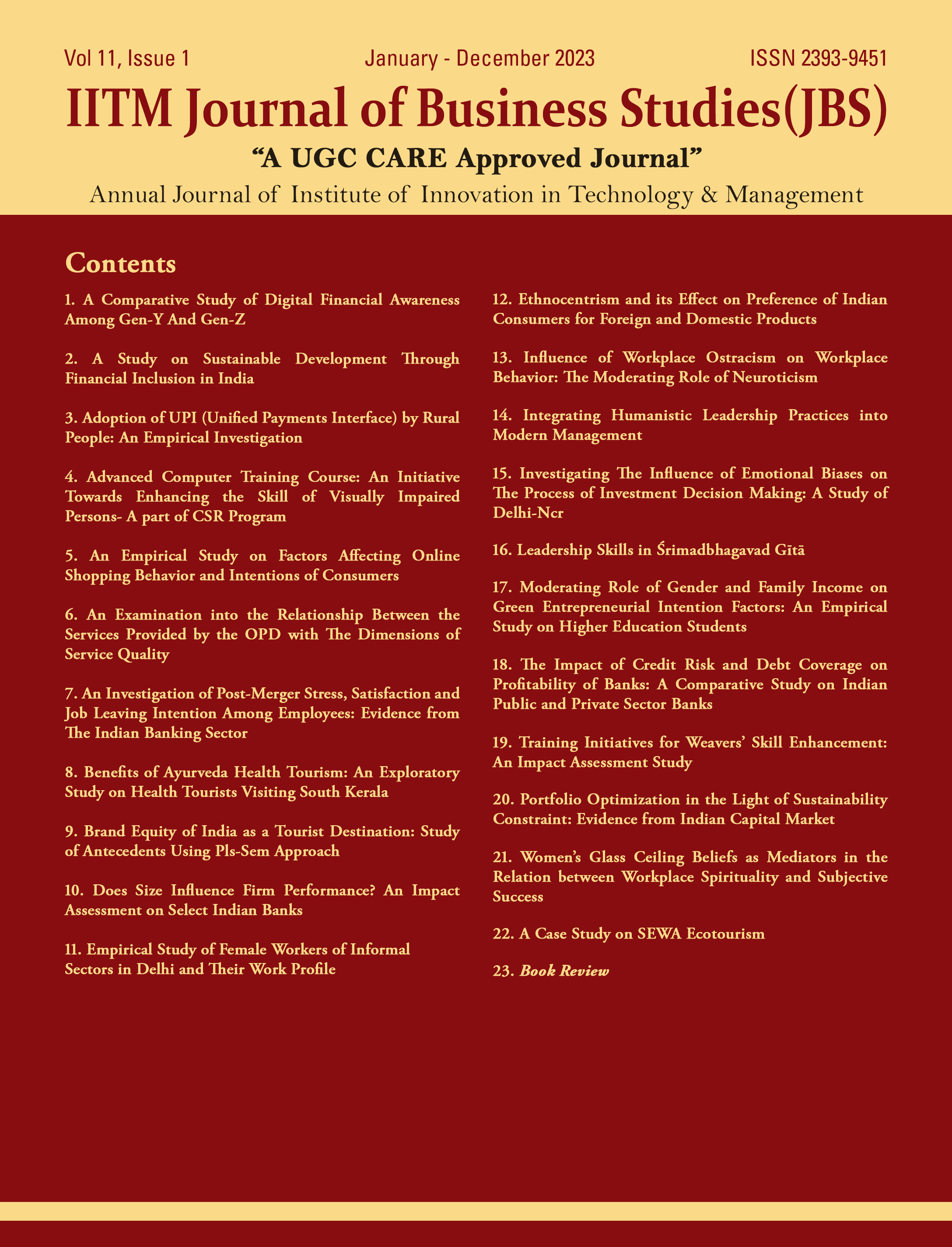ELIMINATING TALENT ACQUISITION CHALLENGES IN THE NEW PARADIGM: A PROPOSED MODEL OF TALENT ACQUISITION PROCESS
Keywords:
Talent Acquisition (TA), Talent Search, Acquisition Cost, Talent GhostingAbstract
In the wake of post-pandemic work dynamics, there’s talent shortage worldwide, even after huge unemployment caused by temporary closing-down of businesses and disrupted economic activities due to COVID-19. There’s enormous cost involved in talent screening, assessment, and hiring after rounds of interview and selection tests, however when newly hired candidate doesn’t turn-up after receiving offer or undergoing onboarding process, whole activity-endeavor is squandered. The new age TA manager face multifold issues in identification, hunt, and sourcing of talent in the ever-dynamic working environment in post-pandemic context. The market of skilled candidates is becoming fiercely competitive in tech-enabled and AI supportive work-era, posing further question of, how and where to detect right talent in right time and at the right cost, who stays with organization at least till the time he starts generating return on investment for the organization. The biggest challenge talent acquisition managers face today is, candidates turning ghosts after selection and receiving employment-offer. It is a loss in terms of time, money, efforts, and work. TA managers are in constant search of solution to cope-with this issue. In this paper we have made an attempt to unravel this burgeoning problem by posing two research questions; What factors determine joining decision post-selection in an organization? And; What strategy should TA manager use to make dynamic talent join the organization when selected after rigorous screening and selection process?
References
Akkermans, J., Richardson, J., & L.Kraimer, M. (2020). The Covid-19 crisis as a career shock: Implications for careers and vocational behavior. Journal of Vocational Behavior, 119(June), 1–5. https:// doi.org/10.1016/j.jvb.2020.103434
Anita, R. (2019). Effective Strategic Talent Acquisition Process - A Conceptual Study. Journal of Management, 31(1), 42. https://doi.org/10.1177/014920630503100101
Arrawatia, M. A., & Verma, R. (2019). CONCEPTUAL STUDY ON CHALLENGES AND MODERNIZATION IN TALENT ATTAINMENT DEVELOPMENT WITH SPECIAL REFERENCE TO IT SECTOR. Journal Of Current Science, 20(March), 0–7.
Bugg, K. (2015). Best Practices for Talent Acquisition in 21st-Century Academic Libraries. CUNY Academic Works, 29(4).
Deeba, F. (2020). The role of data analytics in talent acquisition and retention with special reference to SMEs in India: A conceptual study. IUP Journal of Knowledge Management, 18(1), 7–23. http://proxy. lib.sfu.ca/login?url=https://search.ebscohost.com/login.aspx?direct=true&db=bth&AN=142016763&sit e=ehost-live
Fayoumi, A., & Loucopoulos, P. (2021). Bridging the Strategy Execution Gap of Designing Intelligent Talent Acquisition Systems Using Enterprise Modelling and Simulation. Enterprise Information Systems, 00(00), 1–36. https://doi.org/10.1080/17517575.2021.2005149
Fernandez, S., Stöcklin, M., Terrier, L., & Kim, S. (2021). Using available signals on LinkedIn for personality assessment. Journal of Research in Personality, 93. https://doi.org/10.1016/j.jrp.2021.104122 8. Girotra, R., Kaushik, T., & Dean, A. (2018). Talent Acquisition Challenges Faced by Indian E-Commerce
Startups: Culture as a Moderator. The IUP Journal of Entrepreneurship Development, XV(2), 24. 9. Hancock, B., & Schaninger, B. (2020). HR says talent is crucial for performance - and the pandemic proves it. McKinsey & Company, July, 1–11. https://www.mckinsey.com/business-functions/organization/ our-insights/hr-says-talent-is-crucial-for-performance-and-the-pandemic-proves-it# 10. Hirst, A., & Benson, V. (2021). Advice for post-COVID careers. Physics World, 34(November), 54. 11. Hite, L. M., & McDonald, K. S. (2020). Careers after COVID-19: challenges and changes. Human Resource Development International, 23(4), 427–437. https://doi.org/10.1080/13678868.2020.1779576 12. Holland, D., & Scullion, H. (2021). Towards a talent retention model: mapping the building blocks of the psychological contract to the three stages of the acquisition process. International Journal of Human Resource Management, 32(13), 2683–2728. https://doi.org/10.1080/09585192.2019.1569546 13. James, D. M. B. (2021). Talent Acquisition and Management in Technology Education. International Journal of Advanced Research in Science, Communication and Technology, 2(February), 160–165. https:// doi.org/10.48175/ijarsct-802
Jayathilake, H. D., Daud, D., Eaw, H. C., & Annuar, N. (2021). Employee development and retention of Generation-Z employees in the post-COVID-19 workplace: a conceptual framework. Benchmarking, 28(7), 2343–2364. https://doi.org/10.1108/BIJ-06-2020-0311
JOSE, S. (2019). Innovation in Recruitment and Talent Acquisition: a Study on Technologies and Strategies Adopted for Talent Management in It Sector. International Journal of Marketing & Human Resource Management, 10(2), 1–8. https://doi.org/10.34218/ijmhrm.10.3.2019.001 16. Pandey, D. S., Bhave, D. S., & Prajapati, G. (2021). HR PRACTICES HIGHLIGHTS DURING COVID: DISCUSSION BASED ON NEWS PAPER ARTICLES. Journal of Applied Management Jidnyasa, 13(1), 99–109.
Pandita, D., Professor, A., & Pune, S. (2019). Talent Acquisition: Analysis of Digital Hiring in Organizations. SIBM Pune Research Journal, XVIII(September), 2249–1880.
Phillips-Wren, G., Doran, R., & Merrill, K. (2016). Creating a value proposition with a social media strategy for talent acquisition. Journal of Decision Systems, 25, 450–462. https://doi.org/10.1080/1246 0125.2016.1187398
Potočnik, K., Anderson, N. R., Born, M., Kleinmann, M., & Nikolaou, I. (2021). Paving the way for research in recruitment and selection: recent developments, challenges and future opportunities. European Journal of Work and Organizational Psychology, 30(2), 159–174. https://doi.org/10.1080/13 59432X.2021.1904898
Sharma, G. G., & Stol, K. J. (2020). Exploring onboarding success, organizational fit, and turnover intention of software professionals. Journal of Systems and Software, 159, 110442. https://doi.org/10.1016/j. jss.2019.110442
Sharma, R. (2018). Employer brand and its unexplored impact on intent to join. International Journal Of Organizational Analysis, 26(3). https://doi.org/10.1108/IJOA-11-2017-1280 22. Silzer, R. F., & Dowell, B. E. (2009). Strategy-Driven Talent Management A Leadership Imperative. 23. Srivastava, P., & Bhatnagar, J. (2010). Employer Brand for Talent Acquisition: An Exploration towards its Measurement. Vision: The Journal of Business Perspective, 14(1–2), 25–34. https://doi. org/10.1177/097226291001400103
Umachandran, K. (2021). Application of artificial intelligence for recruitment in manufacturing industries. Journal of Emerging Technologies (JET), 1(1), 11–18. https://journals.jfppublishers.com/jet/ 25. Walford-Wright, G., & Scott-Jackson, W. (2018). Talent Rising; people analytics and technology driving talent acquisition strategy. Strategic HR Review, 17(5), 226–233. https://doi.org/10.1108/shr-08-2018-0071 26. Whysall, Z., Owtram, M., & Brittain, S. (2019). The new talent management challenges of Industry 4.0. Journal of Management Development, 38(2), 118–129. https://doi.org/10.1108/JMD-06-2018-0181

